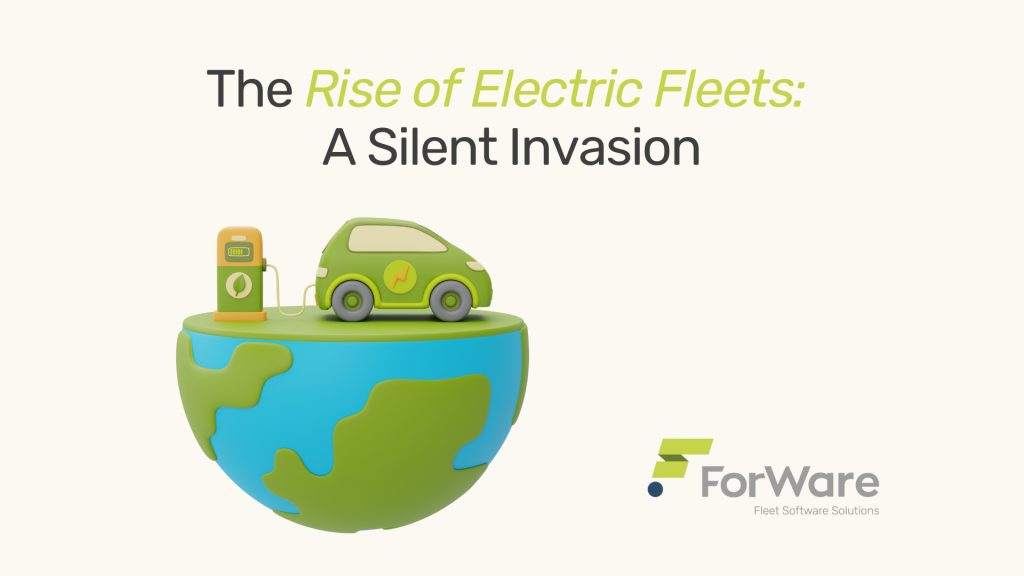Once a novelty, you don’t have to wander far these days to witness an EV buzzing by. At the time of writing, electric cars represented a whopping 7827 of new vehicle registrations in Ireland so far in 2021, versus 3613 for the same period just a year before. It’s not just private individuals; recent times have seen a vast increase in electric vehicles in commercial and public sector fleets throughout Ireland and the rest of Europe. With most countries having set emissions targets for the next decade, it’s something we’re going to see more of, not less. In this article, we’ll look at some examples of how EVs are making their presence felt in various European fleets. We’ll also discuss the implications electric vehicles will have on fleet maintenance and the anxieties Fleet Managers may have around infrastructure to support EVs.
Existing Irish Electric fleets
An Post has already made great strides towards implementing an electric vehicle fleet, which is currently Ireland’s largest. It now has over 840 electric vehicles and aims to have 2,000 in 2022. It’s not just the public sector parcel service either; DPD has indicated that it will have 250 electric cars in its fleet by 2025.
Another example of a public sector electric fleet success story is Inland Fisheries Ireland, which rolled out a fleet of Hyundai Kona EVs in 2019. While we’ve yet to see widespread implementation of electric fleets in Irish emergency services, it’s really only a matter of time.
The emergence of electric emergency fleets in the UK
Over in the UK, already several police departments, including London’s Metropolitan Police, have taken on the Ford Mustang Mach-E for evaluation. Safeguard SVP carried out the conversion from a standard Mach-E, and, with an impressive 379-mile range, this could well be the shape of things to come for police fleets in the UK. Further north, the West Midlands Ambulance Service has already introduced a number of electric emergency vehicles into its fleet with a commitment to only ordering electric from this year on.
European fleets go electric
There’s much evidence of a move towards electric fleets on the Continent too. In Germany, Hanover’s police department recently took delivery of 10 Volkswagen ID.3 EV hatchbacks, the first of a total police fleet of 215 such vehicles throughout the Lower Saxony region. While these are intended for covert operations and do not carry a police livery, they bode well for the eventual rollout of more electric vehicles throughout the police fleet.
It’s not just in the Emergency Services we have seen recent electric announcements either, and Austria-based health firm Biogena recently took on a fleet of no less than 82 Mini EVs. Electric fleets are arguably becoming as trendy and marketable as they are efficient and environmentally friendly.
What are the implications of electric vehicles on fleet maintenance?
Of course, aside from the efficiency of the day-to-day operation and meeting CSR targets, the discerning Fleet Manager may well be looking at the implications an electric fleet will have on their maintenance spend. The good news is that the long-term costs of running an electric fleet tend to be less than that of a petrol or diesel fleet. There are fewer consumables involved; electric vehicles don’t require engine oil, for example. All-round there are fewer moving parts when it comes to the engine and transmission of an electric car – thus, there’s less to be replaced, and less in the way of filter replacement too. While yes, the initial purchase of an electric vehicle can be higher than its fossil-fueled powered variant, Fleet Managers will benefit from significantly reduced fleet maintenance costs over the life of the car.
Of course, electric vehicle maintenance is more specialised and requires further training for technicians. As a result, it’s predicted that we’ll see more and more fleets move towards using dealer network garages for their Fleet Maintenance needs.
Electric fleet infrastructure on the rise
It’s probably one of the main concerns for those looking at going electric – will the infrastructure be there to support it? Indeed, it will take some collaboration between local authorities and transport bodies, but where there’s a will there is a way, and we already see much evidence of this. This summer saw Ireland approve new regulations that will require infrastructure to be provided that will enable the installation of recharging points for Electric Vehicles. This is applicable for new buildings or existing buildings undergoing a significant renovation with more than ten car parking spaces. Existing buildings (other than dwellings) with more than 20 car parking spaces will also have to have a minimum number of charging points installed before 2025. In Scotland, a ‘green corridor’ is being established, which will see no less than 49 charging sites constructed between Edinburgh and Glasgow. This is just phase 1 of a project which eventually sees even remote locations such as the Scottish Highlands gain adequate charging points to support electric fleets. Over in Germany, their government has made it mandatory for all filling stations to include charging points for electric vehicles.
These are just some examples of how countries are making it easier to operate electric fleets, which should remove any ‘range anxiety’ that could be making Fleet Managers hesitant to go electric.
The future is electric
At this stage, few would argue that the future of vehicle fleets isn’t electric. Recent growth trends in the EV market will only continue, and the changeover is by now well and truly started. While there’s understandable anxiety over range, more and more countries are rolling out plans that’ll see this becoming less and less of a concern, to the point you won’t worry about running out of electricity any more than you would fear running out of petrol. The implications of fleet maintenance look positive, with less consumable spending and part wear. Whatever the case maybe, ForWare will be there to help you look after your fleet maintenance needs, electric or otherwise.



